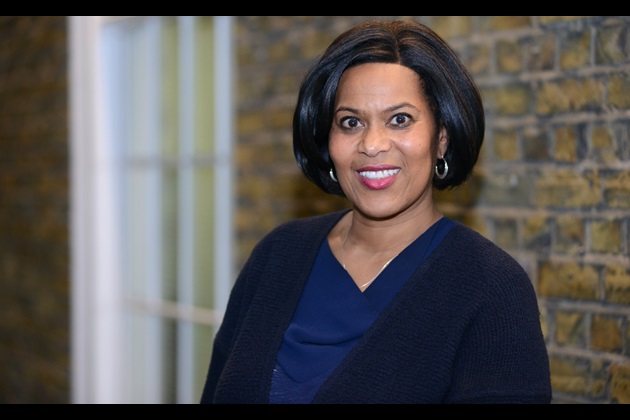Yvonne Coghill has a passion for improving the working lives of nursing staff to enhance patient care, safety and satisfaction. We find out more about her as she takes on her new role.
Why did you want to become a nurse?
My mother worked as an auxiliary nurse in Bristol after coming here from Guyana in the sixties. As a little girl I remember watching her care for patients and thinking that nursing was the most wonderful profession in the world. I never wanted to be anything else. She inspired me to help and support people. So I guess it’s in my blood.
How did your nursing journey begin?
I left school at 18 and went into nurse training, working first in cardiac care, then orthopaedics before doing a postgraduate certificate in mental health and working in psychiatry. After starting a family, I moved into health visiting, then community practice teaching and took on my first management position, overseeing health visitors, school nurses and district nurses. It was a baptism of fire, going from managing myself to more than 25 people overnight. But it ignited my passion for leadership and I set my sights on becoming a director of nursing.
When did you get your big break?
It actually came after several setbacks. I applied for five director level posts and didn’t get any of them. It was very sobering for me. My self-esteem got knocked and I felt demoralised and depressed. I decided to leave nursing and the NHS, instead taking a role as a primary care manager for Londonwide Local Medical Committees (LMCs). It was around this time that Nigel Crisp, who was the Chief Executive of the NHS, launched his race equality action plan. As part of this he wanted to mentor someone from a black and minority ethnic (BME) background and invite them to be one of his private secretaries. That person was me.
What did you learn from that?
Gosh. So much. I learnt about NHS budgeting and strategy and how to influence government ministers. I was sitting in the private office of the most powerful man in the NHS so many things that got escalated to him went through me. It also opened the door to working in equality and diversity and helped me to start figuring out why director level posts were closed off to me. I may not have been ready for them but there was also something deeper going on about the latent discrimination of BME people working in the NHS.
How has that shaped your career?
I got a job leading the National Breaking Through Programme, which aimed to develop BME staff to be the best they could be and get high level jobs in the NHS. The funding for that got cut but new research was coming out that demonstrated the need for more action. The Workforce Race Equality Standard (WRES) was launched to ensure employees from BME backgrounds have equal access to career opportunities and receive fair treatment in the workplace. I have been Director of the WRES since 2015.
What are the key issues facing BME nursing staff?
Data shows us that if you’re from certain ethnic backgrounds you have a poorer experience of working in the NHS. You’re more likely to be disciplined and taken off the register, and less likely to be appointed or sent on non-mandatory training. We also know that poorer treatment of staff results in poorer quality care for patients. The experience of BME staff is a barometer for the experiences of all. It highlights the red flags of what is going on in an organisation.
Ensuring staff feel valued and supported is absolutely crucial to the long-term success of the NHS
How does the NHS need to change?
There is so much evidence that shows having an engaged workforce leads to higher quality patient care, patient safety and patient satisfaction. Two things drive the NHS; improving care for patients and saving money. If you have an engaged workforce, you get both these things. Ensuring staff feel valued and supported is absolutely crucial to the long-term success of the NHS.
How will being RCN Deputy President help you do this?
It gives me a platform to access more people. Changing workplace culture is tricky. The NHS is a microcosm of society and not everyone buys into my vision. But the key to changing the experiences of BME staff, and therefore all staff, is to make people understand the bigger picture. I can access senior leaders in my job, but the majority of BME nurses are band 5, managed by band 6 or 7 nurses.
These people haven’t been touched by the WRES particularly but they’re the ones that can instigate real change on the ground. If we don’t address these issues, or don’t think they’re important, nurses will invariably feel that it is a job and not a career and patients will feel that they’re getting a service that is not as good as it could be.
What else do you want to do in the role?
I want to help all nursing staff feel valued and appreciated by helping policy-makers understand the importance of this for the delivery of quality patient care. Nursing is a profession that needs to be taken seriously and our professional body, the RCN, needs to be taken seriously.
It needs to be an organisation members can feel proud of, supportive of nurses and nursing, that makes some difficult decisions and says some difficult things to people in power. It needs to be clear what it is in business to do, and who it needs to do business with.
We’re accountable to our members, who are incredibly important. And we must make sure that we engage them. What struck me was the low turnout in the elections that have got me here. Just 6% of members voted. That makes me think something isn’t right and we have a duty to figure out what that something is.
If all our 435,000 members were engaged with the RCN and supported us in our mission to improve things for nursing then the Government would have to sit up and listen. So as I go out and speak to members in this role, I’ll be asking them what the RCN could do to engage them and what they could do to support the aims of the College.








